Nicolae A. Drăgan (02-02-1941) Romanian composer
Nicky Drăgan composed direct mates, helpmates, fairy problems and retro problems.
Here is an example of his art:
Drăgan, Nicolae A.
Romanian Championship 1969- 1970
1
st Place
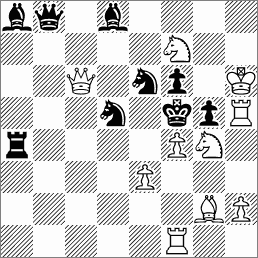
Show Solution1.Bh3! (2.Sf2#)
1...Rxf4 2.Qc2#
1...Sdxf4 2.Se5#
1...Sexf4 2.Sxf6#
1...Qxf4 2.Sd6#
1...Ke4 2.Qc2#
1...Sxe3 2.Sxe3#
Give-and-take key,
Schiffman defence (4 times).
And one example of miniature helpmate, simple and cute:
Drăgan, Nicolae A.
Ajedrez Mágico, Jun 1971 (27/996)
Comm.
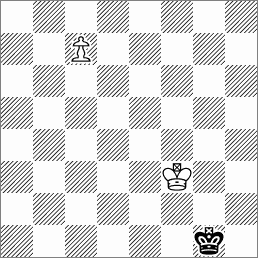
Show Solution1.Kf1 c8=Q 2.Ke1 Qc1#
1.Kh2 c8=R 2.Kh3 Rh8#
Ideal mates,
Wenigsteiner.
Andrew Kalotay was successful as a chess player but seems to have abandoned o.t.b. competitions for composition (biographical information
can be found on Wikipedia - Thank you Dr. Dowd!) He mostly composes helpmates concluded in an ideal mate.
One of his best works was composed in collaboration with GM Pál Benkö:
Benkö, Pál & Kalotay, Andrew
The Problemist, 1989
4
th Prize

| h#3.5 |
b) Move b8 a7
c) Move b3 c2 | 3 + 1 |
Show Solutiona) 1...Re2+ 2.Kd3 Re3+ 3.Kd2 Bf4 4.Kc1 Re1#
b) 1...Rh2 2.Kd3 Rh1 3.Kd2 Bg1 4.Kc1 Be3#
c) 1...Rd1 2.Kf3 Kd2 3.Kg2 Ke1 4.Kh1 Kf2#
Battery creation and play, exchange of functions, in a perfectly economical presentation.
Slobodan Šaletić (02-02-1944) Serbian composer
Slobodan Šaletić was a member of the editing team of "Šahovska kompozicija", together with Radivoje Urošević and Ljubiša Papić. He composes heterodox problems, sometimes in collaboration:
Šaletić, Slobodan
Euxinus Pontus, 2008
3
rd Comm.
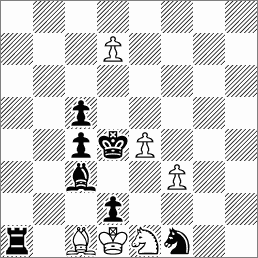
Show Solutiona) 1.dxe1=S d8=S 2.Sd3 Sc6#
b) 1.dxc1=B d8=B 2.Be3 Bf6#
Henrik Juel (02-02-1945) Danish composer
Henrik Juel composes all genres of problems, but lately mostly retro compositions (proof games, illegal clusters, etc). Here is a
proof game in 8 moves (2 solutions):
Juel, Henrik
R0103 StrateGems 19 2002
Special Comm.
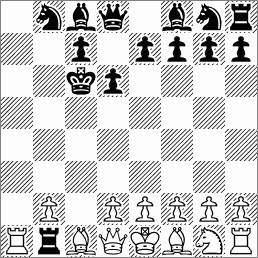
| SPG 8.0 | | 13 + 14 |
| 2 solutions | |
Show Solution1) 1. c4 b5 2. Qa4 b4 3. Qxa7 b3 4. Qxa8 bxa2 5. Qa4 axb1=R 6. Qd1 d6 7. c5 Kd7 8. c6+ Kxc6 diagram
2) 1. a4 d6 2. a5 Kd7 3. a6 Kc6 4. axb7 a5 5. Ra3 a4 6. Rb3 axb3 7. bxa8=R bxc2 8. Ra1 cxb1=R diagram
Switchback of the wQ to d1 in 1),
Pronkin promotion to wR in 2).
(Sergey Vladimirovich Radchenko)
Composes miniatures, generally with ideal mates.
Радченко, Сергей Владимирович
Мат (Черкаси) 1991
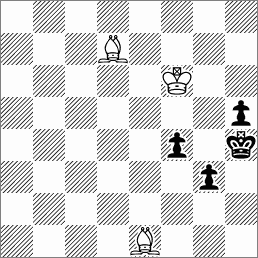
Show Solution1.Bd2! ZZ
1...f3 2.Bg5#
1...g2 2.Be1#
Ivan Skoba (02-02-1950) Czech composer
Ivan Skoba was recently noticed for his successes with long series problems that competed in the
tourneys organized by Itamar Faybish. But here is something completely different from series problems:
Skoba, Ivan
Šachová skladba, 1999
1
st HM
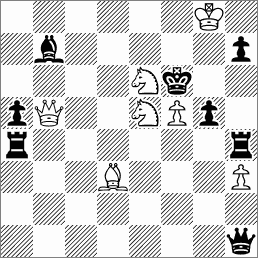
Show Solution1.Qd7 ! (2.Qg7#)
1...Qe4 2.Sf3 (3.Qf7#) 2...Qxf3, Qxe6+ 3.Qg7, Qxe6#
1...Rae4 2.Sc4 (3.Qf7#) 2...Rxc4 3.Qg7#
1...Rhe4 2.Sg4+ Rxg4, Kxf5 3.Qg7, Qf7#
1...Be4 2.Sc6 (3.Qf7#) 2...Bxc6 3.Qg7#
1...Kxe5 2.Qc7+ Kd5, Kf6 3.Qc5, Qg7#
Horst Bäcker (Deichelbohrer) (02-02-1952) German composer
Horst Bäcker seems to publish his problems exclusively in German magazines (Problemkiste, die Schwalbe) and to have a soft spot for promotions, but the quality of his works is noteworthy. He composes in many genres.
Horst was born Deichelbohrer (source:
Die Schwalbe Inhaltsverzeichnis, Band XXI, 1992–1994, page III; thanks to
Peter Hoffmann for bringing this up). Horst Deichelbohrer published good problems including selfmate Babsons (such as
this one).
Bäcker, Horst
Problemkiste, 1989
Show Solution1.Sxb1[+bRa8]+ !
1...cxb1=Q 2.e8=B 2...Qxg6 [+wPg2] 3.Bxg6 Sc6/Sc8#
1...cxb1=S 2.e8=Q Sd2 3.Qe1 Sc6/Sc8# or 2...Sxa3 [+wBc1] 3.Bxa3 Sc6/Sc8#
1...cxb1=R 2.e8=R Rxg1 3.Re1 Sc6/Sc8#
1...cxb1=B 2.e8=S Bxg6 [+wPg2] 3.f5 Sc6/Sc8#
1...cxb1=G 2.e8=G Gh1 3.Gh5 Sc6/Sc8#
Super
Babson.
Bäcker, Horst
Problemkiste, Jan 2007 (168/A10)

Show Solution1.c8=R c1=S 2.Rxc1[+bSb8] bxc1=B[+wRa1] 3.axb8=Q Bf4 4.Qxf4[+bBf8] Bxg7[+wPg2]#
Allumwandlung.
Gerd Hörning composes endgame studies, often in collaboration with G.Josten.
Hörning, Gerd Wilhelm
Nadareishvili MT EG, 2001
Commendation
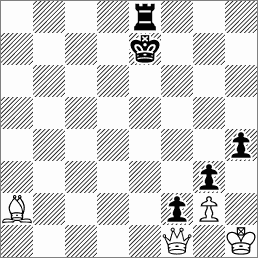
Show Solution1... Kf8
{1... Kd8 ? 2. Qd1+ Kc7 [2... Ke7 3. Bc4 Rd8 4. Qh5 Rd7 5. Qxh4+ Kd6 6. Bb5 Re7 7. Qxg3+] 3. Qc1+ Kb6 4. Qb2+ Kc7 5. Qc3+ Kb6 6. Qb4+}
2. Be6 !
{If 2. Bc4 Re1 3. Ba6 Rxf1+ 4. Bxf1 Black wins in spite of having a Bishop less: 4...Ke7 5. Ba6 Kd6 6. Be2 Kd5 7. Bc4+ Kd4 8. Bd3 Ke3 9. Be2 Kd2 10. Bf1 Ke1 11. Bd3 h3 ! [11... f1=Q+? 12. Bxf1 Kf2 13. Bc4 h3 14. Bd5 hxg2+ 15. Bxg2] 12. gxh3 f1=Q+ 13. Bxf1 Kxf1}
2... Rxe6 3. Qe2 Re3 4. Qxe3 f1=Q+ 5. Qg1 Qf2 6. Qc1 =
高坂 研 (02-02-1969) Japanese composer (Ken Kousaka)
Ken Kousaka
[thanks to Tadashi Wakashima] |
Ken Kousaka writes regularly on tsume-shogi and chess problems in his
mixi diary. He composes proof games.
Kousaka, Ken
Problem Paradise 15/1999
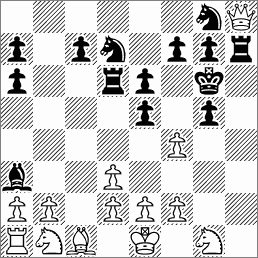
Show Solution1.h4 e5 2.Rh3 Ke7 3.Ra3 Kf6 4.Ra6+ bxa6 5.h5 Bb7 6.h6 Bf3 7.gxf3 Ba3 8.Bh3 Se7 9.Be6 dxe6 10.f4 Qd3 11.cxd3 Rhd8 12.Qa4 Rd6 13.Qe4 Sd7 14.Qg6+ hxg6 15.h7 g5 16.h8=Q Kg6 17.Qh1 Rh8 18.Qa8 Rh7 19.Qh8 Sg8
Phoenix of the white Queen and very nice wQ Rundlauf on three corners h8-h1-a8.




Isn't this Kalotay's wiki page?
ReplyDeletehttp://en.wikipedia.org/wiki/Andrew_Kalotay
Indeed it is. The information has been added to the post. Thanks!
DeleteI believe that CAT was invented by Nicolae Gheran and not by Nicolae Drăgan! (Buletin Problemistic, I- V/1985, p. 10-12)
ReplyDeleteCorrect! The mention to CAT has been deleted.
Delete